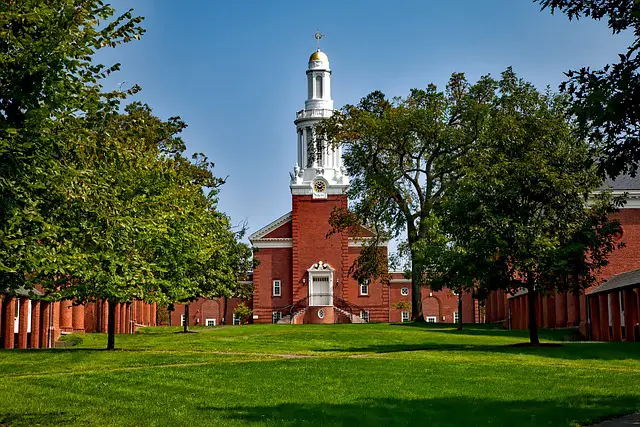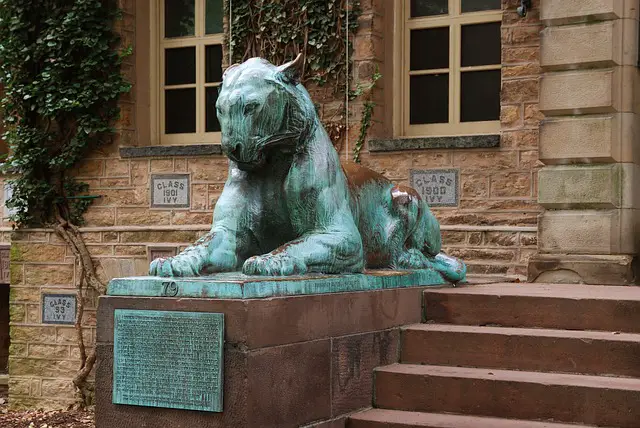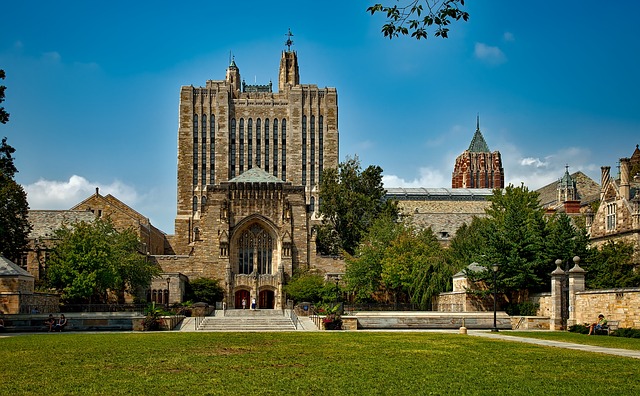Ivy league universities typically require higher standards of academic performance and provide students with a more exclusive experience due to their selectivity in admissions. On the other hand, universities provide more flexible degree programs which allow for broader educational opportunities while also providing access to larger financial aid packages that can help make college more affordable.
Ivy League Schools
(Image by David Mark from Pixabay )

The Ivy League is a group of eight prestigious private universities in the northeastern United States that are known for their academic excellence, selective admissions policies, and strong athletic programs. The Ivy League schools are all private, non-profit institutions that are among the oldest and most prestigious universities in the United States. They are known for their rigorous academic programs, world-class faculty, and strong research programs. The Ivy League schools also have a long history of producing successful and influential alumni in a variety of fields, including business, politics, law, and the arts. The Ivy League schools are highly competitive, and admission to these universities is among the most selective in the world.
Universities
A university is an institution of higher education that typically offers undergraduate and graduate programs leading to degrees in a variety of academic fields. Universities often conduct research and scholarship in addition to providing education and training to students.
The term “university” comes from the Latin word “universitas,” which means “community of teachers and scholars.” The first universities were founded in Europe in the Middle Ages, and many of them were affiliated with the Catholic Church. Over time, universities have evolved and expanded to become important centers of learning, research, and innovation.
Today, universities around the world offer a wide range of academic programs and degree options, including bachelor’s, master’s, and doctoral degrees. Universities may also offer professional programs in fields such as law, medicine, business, engineering, and education. In addition to traditional classroom instruction, many universities also offer online courses and other forms of distance learning. Universities are often important centers of research and innovation, and they may be affiliated with research institutes or other organizations dedicated to advancing knowledge in a particular field.
Differences between the two
“Ivy League” is a term used to refer to a specific group of universities in the United States, which are eight in number and all happen to be prestigious and private. Universities, on the other hand, is a broader term that refers to a wide variety of institutions of higher education.
The Ivy League schools are all universities, but not all universities are Ivy League schools. There are many universities in the United States that are not part of the Ivy League, including public universities and other private universities that are not as selective or prestigious as the Ivy League schools.
The Ivy League schools are known for their academic excellence, selective admissions policies, and strong athletic programs, and they have a reputation for producing successful and influential alumni. They are all located in the northeastern United States and are relatively small, with undergraduate enrollments ranging from around 5,000 to 15,000 students.
Other universities, including public universities, may have larger student bodies and a wider variety of programs and degree options. However, many universities share similar characteristics with the Ivy League schools, including rigorous academic programs, world-class faculty, and strong research programs. Ultimately, the main difference between Ivy League schools and other universities is the specific group of eight prestigious private institutions that are part of the Ivy League.
Pros and Cons of Ivy League Schools
Pros of Ivy League Schools:
- Academic Excellence: Ivy League schools are renowned for their rigorous academic programs and world-class faculty, which attract top students from around the world. Students at Ivy League schools have access to exceptional resources and opportunities to challenge themselves academically.
- Prestige and Networking: Ivy League schools are among the most prestigious universities in the world, and having an Ivy League degree can open doors to elite job opportunities and influential networks.
- Strong Career Outcomes: Graduates of Ivy League schools tend to have strong career outcomes, with high salaries and opportunities for advancement.
- Generous Financial Aid: Ivy League schools are committed to providing financial assistance to students who need it. Many Ivy League schools offer generous financial aid packages to help students afford the high cost of tuition.
Cons of Ivy League Schools:
- High Cost: Ivy League schools are some of the most expensive universities in the world, with tuition and fees that can exceed $70,000 per year. This can make it difficult for some students to afford to attend.
- High Stress and Competition: Ivy League schools are known for their intense academic environment and competitive student culture. This can lead to high stress levels and pressure to succeed at all costs.
- Lack of Diversity: While Ivy League schools are committed to diversity and inclusion, they still tend to be less diverse than other universities, particularly in terms of socioeconomic and racial diversity.
- Limited Focus on Practical Skills: Ivy League schools tend to focus more on academic theory and research than on practical skills and job training. This can make it more difficult for students to transition to the workforce after graduation.
Pros and Cons of Universities
Pros of Universities:
- Wide Range of Programs: Universities offer a wide range of undergraduate, graduate, and professional degree programs in various fields of study, providing students with many options to pursue their interests and career goals.
- Access to Resources and Facilities: Universities have extensive libraries, research facilities, and other resources that allow students and faculty to engage in innovative research and scholarship.
- Diversity: Universities attract students from diverse backgrounds, cultures, and countries, offering opportunities for students to learn from each other and gain a broader understanding of the world.
- Professional Development: Universities offer a variety of career services, internships, and experiential learning opportunities to help students develop the skills and knowledge needed for success in the workforce.
Cons of Universities:
- High Cost: Like Ivy League schools, universities can be expensive, and tuition and fees can vary widely depending on the institution and program of study.
- Limited Access: Not all students have equal access to universities, particularly those who come from low-income families or underrepresented communities. This can lead to unequal opportunities and outcomes.
- Large Class Sizes: Some universities have large class sizes, which can make it difficult for students to receive individual attention and support from faculty.
- Limited Flexibility: Many universities have rigid academic structures and requirements that limit students’ ability to customize their education and explore different interests. This can make it challenging for students who want to pursue interdisciplinary studies or take classes outside of their major.
How to choose between an Ivy League School and a University
(Image by Oleg Mityukhin from Pixabay )

Choosing between an Ivy League school and a university can be a difficult decision. Both types of schools have their own unique advantages and disadvantages. Here are a few things to consider when making your decision:
Cost: Ivy League schools are notoriously expensive. If you’re looking for a more affordable option, a university may be the better choice.
Location: Ivy League schools are typically located in major metropolitan areas, while universities can be found in cities, suburbs, and rural areas. Consider where you want to live and study when making your decision.
Academics: Ivy League schools are known for their rigorous academic programs. If you’re looking for a challenge, an Ivy League school may be the right choice for you. However, if you’re looking for a more relaxed academic environment, a university may be a better fit.
Extracurriculars: Both Ivy League schools and universities offer a variety of extracurricular activities. Consider what kinds of activities you’re interested in and make sure the school you choose has options that fit your interests.
What are the Ivy League Schools?
The Ivy League Schools are a group of eight prestigious private universities located in the northeastern United States. They are:
- Brown University (Providence, Rhode Island)
- Columbia University (New York, New York)
- Cornell University (Ithaca, New York)
- Dartmouth College (Hanover, New Hampshire)
- Harvard University (Cambridge, Massachusetts)
- University of Pennsylvania (Philadelphia, Pennsylvania)
- Princeton University (Princeton, New Jersey)
- Yale University (New Haven, Connecticut)
These universities are known for their academic excellence, selective admissions policies, and strong athletic programs. They have a reputation for producing successful and influential alumni in a wide range of fields, including business, politics, the arts, and academia.
Which is the easiest Ivy League School to get into?
There are a few factors to consider when determining which Ivy League school is the easiest to get into. The first is the size of the school. The smaller the school, the tougher it is to get in because there are fewer spots available. The second factor is location. Schools in urban areas tend to be more competitive than those in rural areas because there are more applicants. The third factor is academics. Schools that are highly ranked academically are usually more difficult to get into than those that are not as highly ranked.
So, with all of that being said, which Ivy League school is the easiest to get into? It depends on your definition of “easy.” If you consider any Ivy League school to be difficult to get into, then none of them would really fit the bill. However, if you’re looking for an Ivy League school that isn’t as competitive as others, then you might want to consider Brown or Dartmouth.
What is the hardest Ivy League School to get into?
There are a few factors that make some Ivy League schools more difficult to get into than others. For one, schools like Harvard and Yale have large endowments and can be more selective in their admissions. Additionally, these schools tend to have higher numbers of applicants, which can make the process more competitive. Finally, some schools may have different admissions requirements (such as SAT scores or class rank) that make them harder to get into.
Featured Image By – Image by David Mark from Pixabay








